Wellbeing of female crew members in the live music industry 2024
1. Introduction
1.1 About the organisation
Women in Live Music (WILM) was founded in 2018 as a European platform and online community for women working within live events. This includes sound engineers, tour managers, lighting designers, concert photographers, backliners, stage managers, event truck drivers, promoters and more.
1.2. The motivation
The motivation for conducting the survey was to research the impact on the well-being of women who are working backstage within production, logistics and technical fields either at venues/festivals, corporate events or as part of a touring crew.
It has been observed that this group of female crew members doesn’t seem to have expanded significantly in the past ten years, despite more women, especially the younger generation, entering the backstage area.
The percentage of female crew is still estimated to be well under 10 % on the European continent. This would indicate that female crew do not seem to stay in the industry as long as their male colleagues.
This report will explore the impact of the wellbeing of female crew members and if this could be a factor for women not wanting to remain in the industry as long as their male colleagues.
As a note it is worth mentioning that the mapping-part is showing 30 % women who have been working in the industry for 1-4 years, 35 % for 5-10 years, and 35 % for 11+ years, which speaks against the thesis that women do not stay in the industry as long as their male colleagues.
1.3 The sources
The survey “Wellbeing of Female Crew Members in the European Live Music Industry” was carried out by WILM in November 2023 to June 2024. The report presents the findings from the survey, as well as WILM’s recommendations for the future. The focus has been on the testimonials and stories of female crew members in the European live music industry with the aim of forming a basis for further study in this field. The survey has been distributed through Women in Live Music’s online channels which include LinkedIn, Instagram, Facebook and WILM’s own Newsletter.
The survey was part of a mapping of female crew members in the European live music industry.
1011 female crew workers from the backstage area participated in this mapping, representing a broad range of offstage professions, and covering 44 different countries.
Almost half (42%) of the participants resided in the UK, followed by Germany (11%),
The Netherlands (7%) and Sweden (5%), as the countries with the most respondents.
Of the 1011 people who participated in the mapping, 635 also answered the questions about wellbeing in the European live music industry.
These 635 participants make up the results of this report. We acknowledge that our findings represent only a small sample of the industry, but we hope that this will lay the foundation for further research into this field.
*The amount of European backstage crew is currently estimated to make out 700.000 people in total, and therefore the 635 female responses must be considered to make out only a small part of female crew members in Europe
The full survey results can be found in the Appendix section.
2. The Outcome
2.1. Noticeable tendencies within the industry
57 % of 635 participants report noticing a (positive or negative) shift in the culture regarding the working environment in the live music industry since they started.
The majority of respondents who notice a shift said that they feel it is mainly positive. A few respondents however, mention an increase in burnout as a negative tendency within the industry.
“More women = less competition and more kindness. On the other hand I see a lot more burnout/mental issues”. (WILM Wellbeing Survey respondent 2024)
2.1.1. Positive tendencies: Increasing diversity
“Everyone is a lot more open minded now to women, diversity and mental health issues. This was unheard of 20 years ago” (WILM Wellbeing Survey respondent 2024)
More than half of those who mention positive changes cite diversity and the growing representation of women in the live music industry as reasons for the positive shift.
“When I started I rarely worked with another female, especially in certain roles like sound engineer. Most venues tend to be more involved with mental health and working conditions now, where it used to be more important to just get the job done, no matter the conditions, and not moan about it”. (WILM Wellbeing Survey respondent 2024)
Respondents note that although the number of women in the live industry seems to be growing, there is still a long way to go until the numbers are significant. Some of the respondents mention the work of organisations such as WILM as being a contributing factor to an essential change towards a more diverse backstage.
In general, there is a belief that the increasing focus on diversity and female representation is making a difference within the industry.
“There are definitely more women in technical roles which improves the work environment and culture for young women starting out in this field”. (WILM Wellbeing Survey respondent 2024)
2.1.2. Positive tendencies: Professionalisation and growing focus on mental health
In general, the positive respondents note that the industry is becoming more professional. Many respondents mention a growing focus on mental health and wellbeing as a positive change – especially in the aftermath of the pandemic.
“We care more about how much time people spend on projects and we are getting better at saying no to things that are not included in our field of responsibility. It’s not as cool to work til you drop anymore. We talk more about the work environment, mental illness/wellbeing and equality”. (WILM Wellbeing Survey respondent 2024)
Though the respondents report a growing focus on the working environment, working hours and better management, there is still a long way to go for an industry that is known for the individuals to not be seen or heard and where it’s all about survival of the fittest.
“Everything is more professionalised, which makes it a lot safer and more healthy in a general way. Better food, no drinking on the job, sometimes even reasonable hours, livable wages. But there is still lots of unfriendly competition, and ego bullshit, which still makes it quite difficult mentally.” (WILM Wellbeing Survey respondent 2024)
However, many respondents do mention a change in the tone over the years, as well as management teams increasingly taking action on problems related to the work environment.
“I experienced a lot of bullying and negativity for years but recently experienced a shift where the bullies were fired rather than the bullied”. (WILM Wellbeing Survey respondent 2024).
2.1.3. Negative tendencies: Increasing burnout
As mentioned in 2.1, some respondents noticed an increase in burnout as a negative tendency within the industry. This is supported by general experience in the field with UK charity Music Minds Matter reporting a 200 % increase in those seeking free mental health support in the years 2022-2023 **
“Mental health wise I’ve seen a lot of people with a burnout, including myself”. (WILM Wellbeing Survey respondent 2024)
Only a few participants mention burnout directly, but since they were not asked specifically about this issue in the survey, their answers indicate that there could be a bigger issue at hand.
2.1.4. Negative tendencies: Less room for mistakes by female crew members
“I have learned that I really need to make my role clear and constantly point out that I’m in charge of the production. […] I’m acting much rougher doing my job than I do in my private life. I have toughened up in a way that’s not my natural approach to things”. (WILM Wellbeing Survey respondent 2024)
81% of respondents report that they seem to be more afraid of making mistakes than their male colleagues. Female crew members seem to be allowed fewer mistakes before being called out or fired, compared to their male colleagues.
In general there seems to be a lower threshold for how many and what type of mistakes are allowed for female crew members.
“It has varied depending on the attitudes of the crew, companies or venues I have been working with. Naturally over time my confidence in my ability has increased but I do not feel confident that I am not actively discriminated against because of my gender. I often see less experienced men offered work instead of me with no other explanation”. (WILM Wellbeing Survey respondent 2024)
There seems to be a difference in the approach and the treatment of male and female crew members as well.
“People often even approach me differently in emails while still assuming I’m male — and then change their behaviour when learning their mistake (to being less respectful, making me negotiate harder for deals and fees etc.) Even in person it often feels like I have to work pretty hard to “prove I’m one of the boys” in order to be treated equally and let in on the fun, too.” (WILM Wellbeing Survey respondent 2024)
The difference in how women are approached compared to men is also noticed by respondents who have gone through a gender transition.
“Prior to my transition; I never did [feel like needing to prove myself]. And more importantly even, I never needed to. I had no resume, and didn’t need one, and no one ever asked me for any. I worked 200 shows a year, and that was enough proof; if anyone ever wanted any. Since my transition, everything is 180 degrees different.” (WILM Wellbeing Survey respondent 2024)
To be treated differently due to your gender could cause or increase insecurity among the female crew.
“Since I came out as a transgender woman, my confidence has taken a nosedive – confirmation bias & imposter syndrome at work. I second-guess my every move.” (WILM Wellbeing Survey respondent 2024)
The quality of the work effort as well as the payment between men and women also seems to be imbalanced being at a disadvantage to the women.
“I have never felt the need to prove myself but I see that my male colleagues do not struggle with accepting a lower quality outcome. I do love high quality outcomes, but the medium quality outcome of my colleagues gets more support.” (WILM Wellbeing Survey respondent 2024).
2.2. Imposter syndrome among female crew members
“I felt like I had to act a certain way to be accepted as “one of the boys”, especially as I rose to leadership roles, always waiting for my unmasking as a fraud.” (WILM Wellbeing Survey respondent 2024)
Out of the 635 people who answered the question “Have you ever suffered from Imposter Syndrome while doing your job to a degree where you were considering leaving the industry?” 61 % (389) report that they have suffered from job-related imposter syndrome to this degree.
“Don’t know if this is kind of this syndrome, but I always thought or think that my character (shy, introvert) is not made for the music business and that I fail because of it.” (WILM Wellbeing Survey respondent 2024)
Considering that some of the respondents might not be familiar with the term imposter syndrome, it is worth noting that 90% of respondents also state that they have felt a need to prove themselves more than their male colleagues in another question (Question #4 in the survey).
Together, these results paint a picture of an industry where women are still presented with different expectations than their male colleagues. The tendency to leave less room for mistakes by female crew members (as outlined above) supports this picture. Even if the visibility of female crew members is increasing, there is still some way to go in order to ensure equal opportunities and conditions for all.
Imposter syndrome seems to stand in the way of this progress.
“Definitely experienced imposter syndrome a lot but not to the point where I considered leaving the industry, just a daily grind and mental mind shift. Telling myself that they obviously hired me for a reason, they saw I could benefit the team in a specific way and that’s why I’m here” (WILM Wellbeing Survey respondent 2024)
Imposter syndrome seems to be a phenomenon that is common among many crew members both female and male. Still, studies suggest that imposter syndrome is more common in women than men. Imposter syndrome is also more prevalent in high-pressure, high-impact settings, which might explain why it is common among both males and females within the European live music industry. ***
“I’d say 80% of the time I have imposter syndrome. I know women techs in their 70’s with it. We don’t seem to have the self confidence that men have or the self promotion.” (WILM Wellbeing Survey respondent 2024)
A lack of role models or people you can identify with could lead to a feeling of stigmatisation or isolation within the industry, potentially making imposter syndrome worse.
“Through all four years of my studies, as the only female on my course I was feeling like I don’t belong here. When I was working on some of my first shows I counted how many women there are in a team. Looking at the hundreds of people building an arena show I managed to find around 10 women, mainly working as stage manager/ project manager, while only three of them including me were technicians”. (WILM Wellbeing Survey respondent 2024)

What is imposter syndrome?
“a psychological condition that is characterised by persistent doubt concerning one’s abilities or accomplishments accompanied by the fear of being exposed as a fraud despite evidence of one’s ongoing success.”
Source: Merriam-Webster online dictionary
3. Observations
3.1. Increasing focus on mental health and wellbeing
“We now have Awareness Teams on tour and female Crew Rooms.” (WILM Wellbeing Survey respondent 2024)
Many respondents note an increasing focus on mental health within the industry, the results and general evidence also suggests that symptoms and cases of burnout are on the rise. How are these two seemingly opposite tendencies able to exist at the same time?
Part of the explanation could be that the general openness about mental health has led to a greater attention to burnout symptoms and cases. With the increasing focus on mental health, crew members and employers are given new vocabularies and tools to spot and convey the symptoms they experience in relation to burnout. This might lead to more people recognizing and dealing with mental challenges which might have previously been either ignored, suppressed or self-medicated with alcohol and drugs. It must be stressed that the observations of cases of burn out involve all genders in the live music industry.
Even if it is difficult to distinguish sharply between factors and explanations for the rise in reported mental health struggles, WILM believes that it is important to keep the complexities in sight. It might not be possible to determine what factors are most important, but it is crucial to keep the conversation and discussion about these issues open and present.
“The more people I talk to male and female, everyone suffers from it [imposter syndrome] but men don’t talk about it enough.” (WILM Wellbeing Survey respondent 2024)
3.2. Conflicting tendencies related to gender imbalance and diversity
Many respondents note an increase in diversity and visibility of female crew members within the industry as a positive contribution to their wellbeing. At the same time, many of the respondents also note that even though things seem to be getting better, there are still severe problems related to the gender imbalance and lack of diversity.
Despite more visibility of female crew members, the high rates of women reporting imposter syndrome and being afraid of making mistakes, should not be ignored.
With a majority of respondents reporting severe imposter syndrome, having to prove themselves more than their male colleagues, and being more afraid of making mistakes, it is clear that there is still a long way to go in order to improve women’s wellbeing and ultimately make sure that they remain in the industry. WILM has been focusing on this matter since 2018 working hard to create a supportive community, provide network and improve the working skills as a way for the female members of WILM to feel more included.
However, it is important that everyone in the industry continues acknowledging and focusing on how to improve the working conditions for all crew members, including the female crew in order to reach a healthy working environment for all crew members.
With 81 % of the respondents feeling they are more afraid of making mistakes than their male colleagues it seems like there is a need for a change of mindset. The mentioned elements above: a community, network and improvement of workskills is a strategy WILM has been practising with good results for the past 7 seven years.
However, the effort should be made not only by the individual, but also by the industry as a whole.
“Underestimation as a Lighting Designer/ Event manager/Promoter representative, that I’ve dealt with in many forms/ways, just made me more confident and better at what I’m doing. The look in those people’s eyes when they realised they underestimated me only because I’m a woman, it’s priceless!” (WILM Wellbeing Survey respondent 2024)
4. Recommendations in order to maintain wellbeing among crew members
Based on the survey results, WILM has been able to identify several main concerns and problems regarding wellbeing for female crew in the European live music industry. This will give WILM and other stakeholders a better foundation to discuss, answer and support people with the knowledge gained from the survey.
“I try to remind myself that most of the people I work with are sleep deprived, exhausted, missing home, under a lot of stress and running on empty. Working in an environment like this can cause people to snap a lot sooner than they usually would, leading to negative vibes and a lack of morale. I really dislike it when people are unhappy with a scenario (or with me), as my job is to please people after all. I try to remind myself that if somebody is angry at me, it means that somebody is probably angry at them”. (WILM Wellbeing Survey respondent 2024)
4.1. Therapy and coaching
Some of the respondents mention therapy and coaching as strategies to mitigate imposter syndrome and insecurities. While these can be valuable tools for individual development and growth, WILM finds it important to not have them be the only tools. As the challenges regarding wellbeing in the live music industry are collective, the solutions should be collective as well. Therapy and coaching can be great starting points, but collective measures should be promoted and supported by crew members and employers alike.
There are several initiatives within the music industry, though far from enough. Music Support are offering online courses for Mental Health First Aid, which crew from larger touring productions join**
“I’ve started a therapy path in which I’m increasing a lot my self-confidence and this is helping me a lot with my job insecurities” (WILM Wellbeing Survey respondent 2024)
A book like ‘Touring and Mental Health – The Music Industry Manual’ by Tamsin Embleton has also been very helpful to both musicians and crew members as a tool for the road**
“Went through a burn out due to the pressure already in my event management apprenticeship. Learned to set boundaries over the years but that was only possible after I started as a freelancer with my own perfectionism as the main issue instead of bad leadership” (WILM Wellbeing Survey respondent 2024)
4.2. Learning and workshops
Many respondents mention learning as a strategy to mitigate insecurities in relation to their job in the music industry. WILM focuses on supporting the learning journeys of female crew members with the program ‘Safe Learning Environment’ (SLE), a training program that offers mentorship, workshops etc. for members to give a wider set of workskills. Additionally, WILM collects educational resources for an easy entry point to offer further development for newcomers.
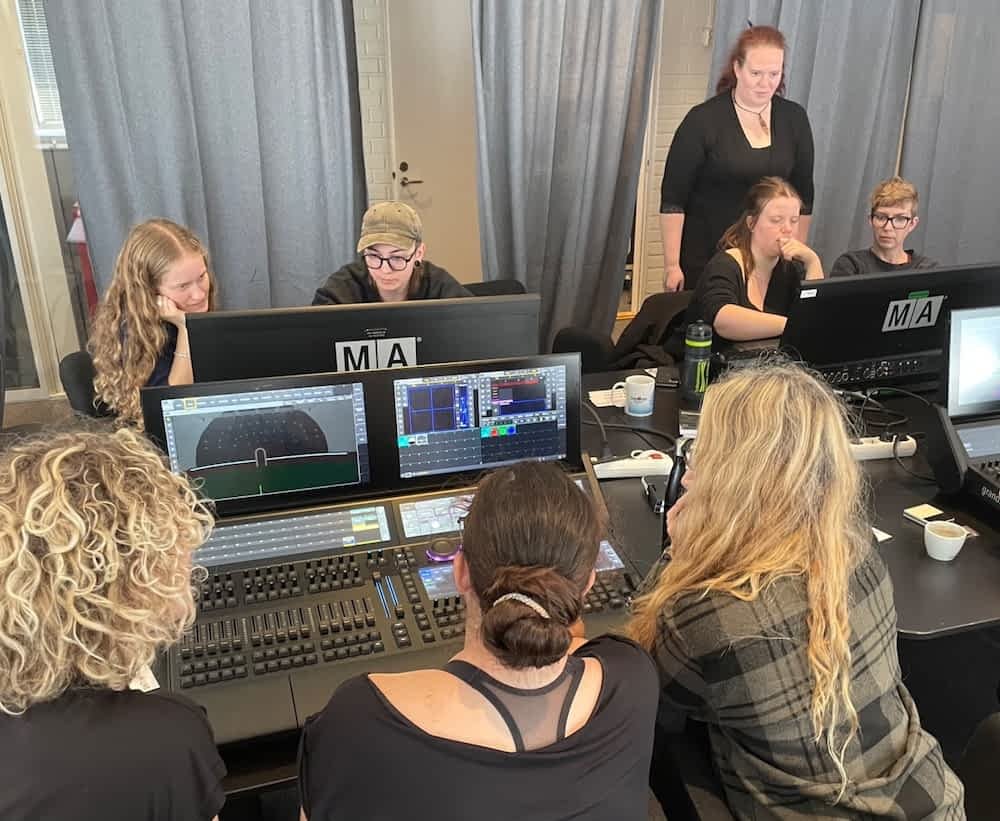
The educational events WILM are offering to both newcomers and veterans focus on different work fields within the backstage area. The workshops, camps etc. covers both introductory and advanced levels, having a special focus on supporting women developing and retaining their skills in the industry. So far there have been close to 100 events in 11 different European countries following the guidelines of the SLE-training program. While WILM aspires to have all activities conducted by female tutors, WILM could not do this without the support from male peers. All of WILM’s activities (except from a very few) are open to all genders.
“It doesn’t necessarily matter [whether activities are all-women or not]. It’s actually very important to encounter men who are supportive and see that not every man in the industry is a douchebag. Also helps to build a healthy work environment. So would prefer a combination of both but maybe more women and less men just to highlight the great pioneers in our industry” (WILM Wellbeing Survey respondent 2024)
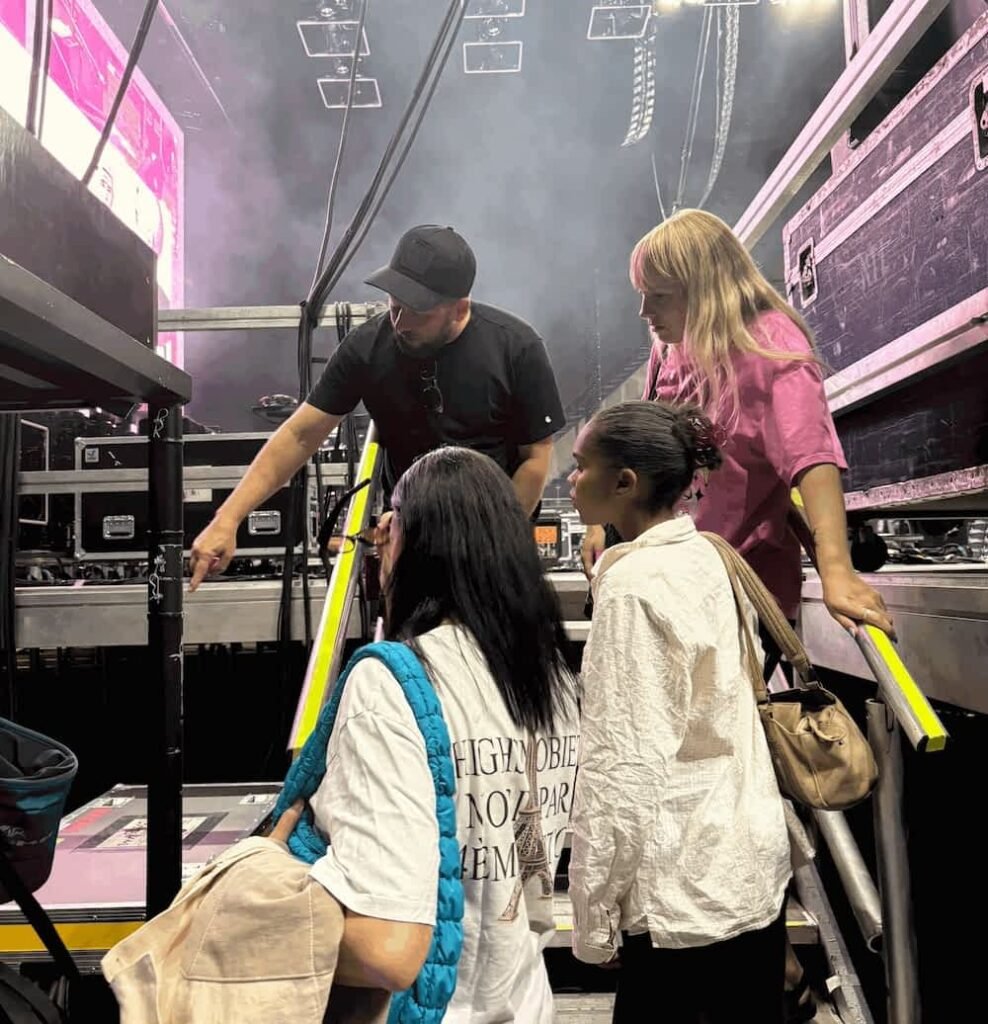
4.3. Visibility and role models
Most respondents mention the increasing visibility of female crew members as contributing to the positive change both within the industry as a whole, but also to their own wellbeing. This is in line with WILM’s belief that seeing other female figures being successful is one of the most important factors for retaining women and maintaining wellbeing in the industry.
“20 years ago seeing a female superior was rare as well as female techs. I’m loving seeing more come up. There’s still an old boys club but we are slowly getting better visibility. LGBTQI+ and those of colour are also seeing more entry streams into the industry and allies to open doors.” (WILM Wellbeing Survey respondent 2024)
Every year, WILM hosts the WILMAwards ceremony, bringing the live music industry together from all over Europe to celebrate outstanding female crew members across 35 different categories. This celebration is the highlight of WILM’s work with role models across European industry roles.
WILM also maintains a database of women active in backstage roles in the form of a Crew List. This has been a valuable tool in connecting our members and making them more visible, providing any artist, production or employer the chance to create a more diverse backstage environment.
Additionally, WILM facilitates mentorships and shadow positions at different shows, companies, and venues. On WILM’s website, there is a list of industry professionals currently offering mentorships. WILM strongly believes that mentoring and sharing knowledge is a strong way to empower female crew members as well as creating space for reflection and discussion.
Sharing knowledge, showcasing and highlighting female role models is at the core of what WILM does, whether it is by being active on social media platforms, participating in conferences or facilitating workshops and talks at festivals.
“I have (surprisingly to myself) been described as a role model recently, and it occurred to me that the younger woman in the industry that said it to me really benefited from us doing productions together. She told me she felt she could ask me ‘stupid’ questions etc. and I realised how important it is to have forums for women only where we can share experiences and educate each other” (WILM Wellbeing Survey respondent 2024)
4.4. Networking and meet-ups
Beside the need for role models, many respondents mention networking with other women in the industry as a valuable strategy to mitigate insecurities. Respondents express the need for safe spaces to connect and learn from each other.
WILM has great success facilitating different networking events aimed at female crew members across different fields. With a circle of women, WILM wishes to introduce a more relaxed and flexible learning environment where mistakes can be made, and where there is time and space to learn and practice. The networking events often take the form of Walk & Talk events, where WILM members will be introduced to the backstage area at larger touring productions. Other initiatives are the festival camp projects that are executed in association with selected festivals. These projects offer learning and networking opportunities for especially younger female crew members.
“I believe it would [be nice to have all-women activities], but it would also be nice to have mixed audience, so the males in the industry can realise how the comments affect us” (WILM Wellbeing Survey respondent 2024)
5. Conclusion
Taken as a whole, the survey results underline that even though there are some positive tendencies in the European live music industry, there are also obstacles which need to be overcome in order for WILM and its members to reach the goal of a sustainable 15 % of female crew members in the European live music industry before 2030.
The survey shows that 70 % of the respondents have worked more than 5 years in the industry. In addition the majority of the respondents underline that the backstage area overall serves a more healthy working environment with decent work hours, better catering and a bigger focus on mental health. However, the results of the survey also show an industry where women are still presented with different expectations than their male colleagues.
At the same time, the respondents offer valuable insights into the wellbeing of female crew members in the European live music industry, laying the foundation for an even more focused effort by WILM and other industry stakeholders in order to welcome new female crew members as well as retain those already working in the industry.
The challenges related to imposter syndrome and burnout are real and should not be ignored going forward. Even if part of the increase in burnout cases can be attributed to the increasing awareness of mental health, it is important to keep an eye on the development of these issues in general and support mental health and wellbeing within the live music industry for all genders.
The survey results emphasise the need for strong collective measures as tools to improve the wellbeing of female crew members and retain women in the European live music industry.
Even if many respondents mention individual strategies such as therapy to cope with the challenges of their work life, it is important to meet structural and collective challenges with collective strategies.
The future’s looking bright with most respondents noticing positive tendencies within the industry. WILM will stay focused on these issues going forward, hoping that others in the industry will follow to make an effort to retain diversity in the backstage area of the live music industry.

This paper is courtesy of Women In Live Music.
Please reach out for further information by emailing info@womeninlivemusic.eu
Appendix
The “Wellbeing of female crew members in the European live music industry” survey was carried out by Women in Live Music in the time period of November 2023 to June 2024. This summary is a simplified version of the results.
Note: The survey was part of a larger mapping of female crew members in the European live music industry. The first three figures below (Q2 In which country do you live?, Q3 Your Age?, and Q5 How many years have you worked in the music industry?) represent the answers of the respondents (1011 people) of this mapping. The remaining answers represent the participants in the wellbeing survey only. Also, numeric results have been rounded to the nearest whole number.
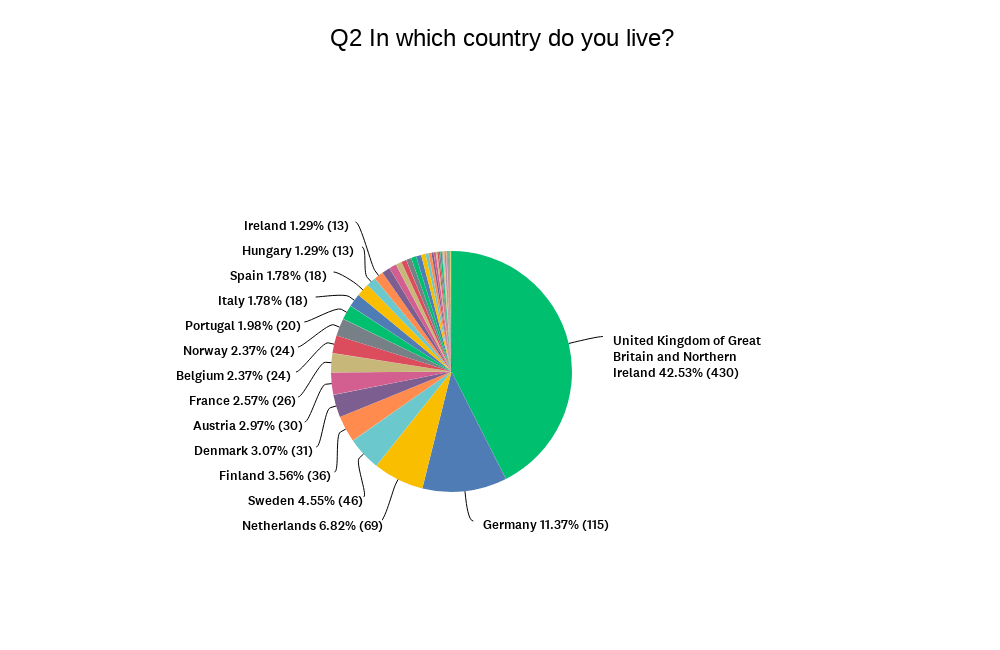
The survey also had participants from Poland (11), Switzerland (10), Estonia (8), Lithuania (7), Romania (7), Serbia (7), Slovenia (6), Czech Republic (4), Greece (4), Bulgaria (3), Andorra (2),, Latvia (2), Cyprus, Georgia, Liechtenstein, Luxembourg, Malta, Slovakia, North Macedonia, and Ukraine.
Additionally, 20 respondents were from outside Europe, signifying that even though WILM is a European organisation, the issues are globally presented.
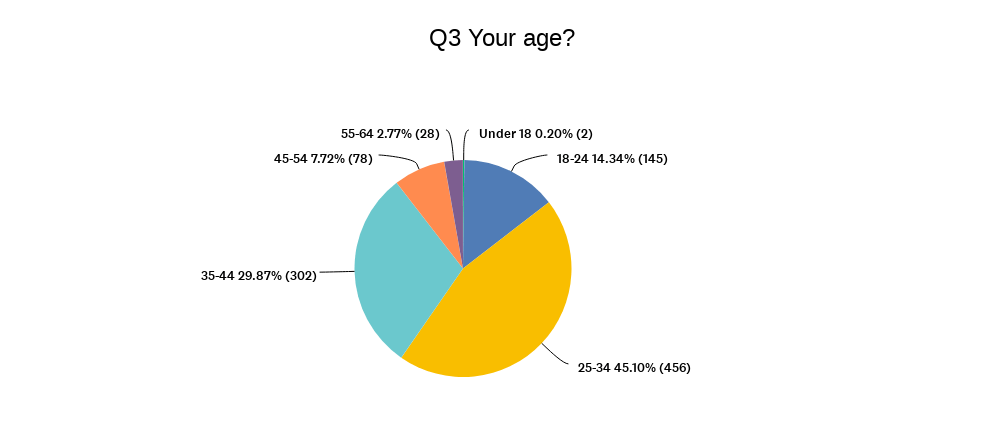
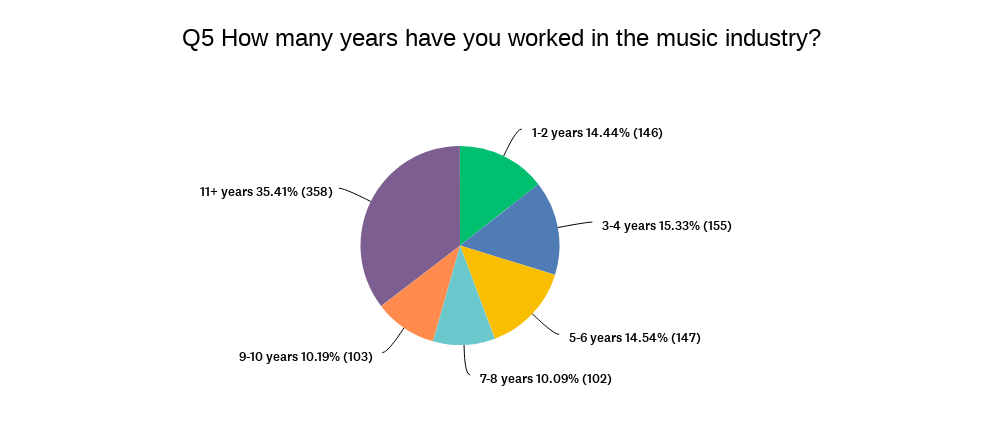
Question 1: Have you experienced a noticeable shift (positive or negative) in the culture regarding work environment in the live music industry since you started?
Answers: 635
No: 43 % (270)
Yes: 57 % (365)
Question 2: Have you felt a change in your own confidence within your trade since you started out in the live music industry?
Answers: 635
Yes: 84 %
No: 16 %
Question 3: Have you ever suffered from Imposter Syndrome while doing your job to a degree where you were considering leaving the industry?
Answers: 632
Yes: 61 %
No: 38 %
Question 4: Have you ever felt that you have to prove yourself more than your male colleagues while performing your trade in the live music industry?
Answers: 632
Yes: 90 %
No: 10 %
Question 5: Do you think you are more afraid of making mistakes than your male colleagues might be of making mistakes?
Answers: 632
Yes: 81 %
No: 19 %
Question 6: Have you experienced any behaviour or comments from other colleagues related to your gender while on a job, positive or negative that made you feel uncomfortable?
Answers: 633
Yes: 79 %
No: 21 %
Question 7: Have you yourself taken steps to mitigate insecurities in relation to your job in the music industry?
Answers: 629
Yes: 53 %
No:47 %
Question 8: If you are interested in training/workshops with WILM would it have a positive impact on your participation if the training was for women by women?
Answers: 631
Yes: 48%
No: 52%
* Introduction: The number of total crew in Europe incl. The UK, Norway, Island, Switzerland, Lichtenstein and the Balkans. There are no exact number of total crew members in Europe. The 700.000+ is an estimate based on numbers that were revealed during the pandemic 2020 – 2022 by initiatives like ‘We Make Events’ across Europe.
*** 2.2 US National Library of Medicine: https://www.ncbi.nlm.nih.gov/books/NBK585058/
**** 4.1 Music Support: https://www.musicsupport.org/online-mental-health-first-aid-training-course/
* 4.1 The book ‘Touring and Mental Health’ https://www.touringmanual.com/
Please email WILM directly for more information on the training program ‘Safe Learning Environment’